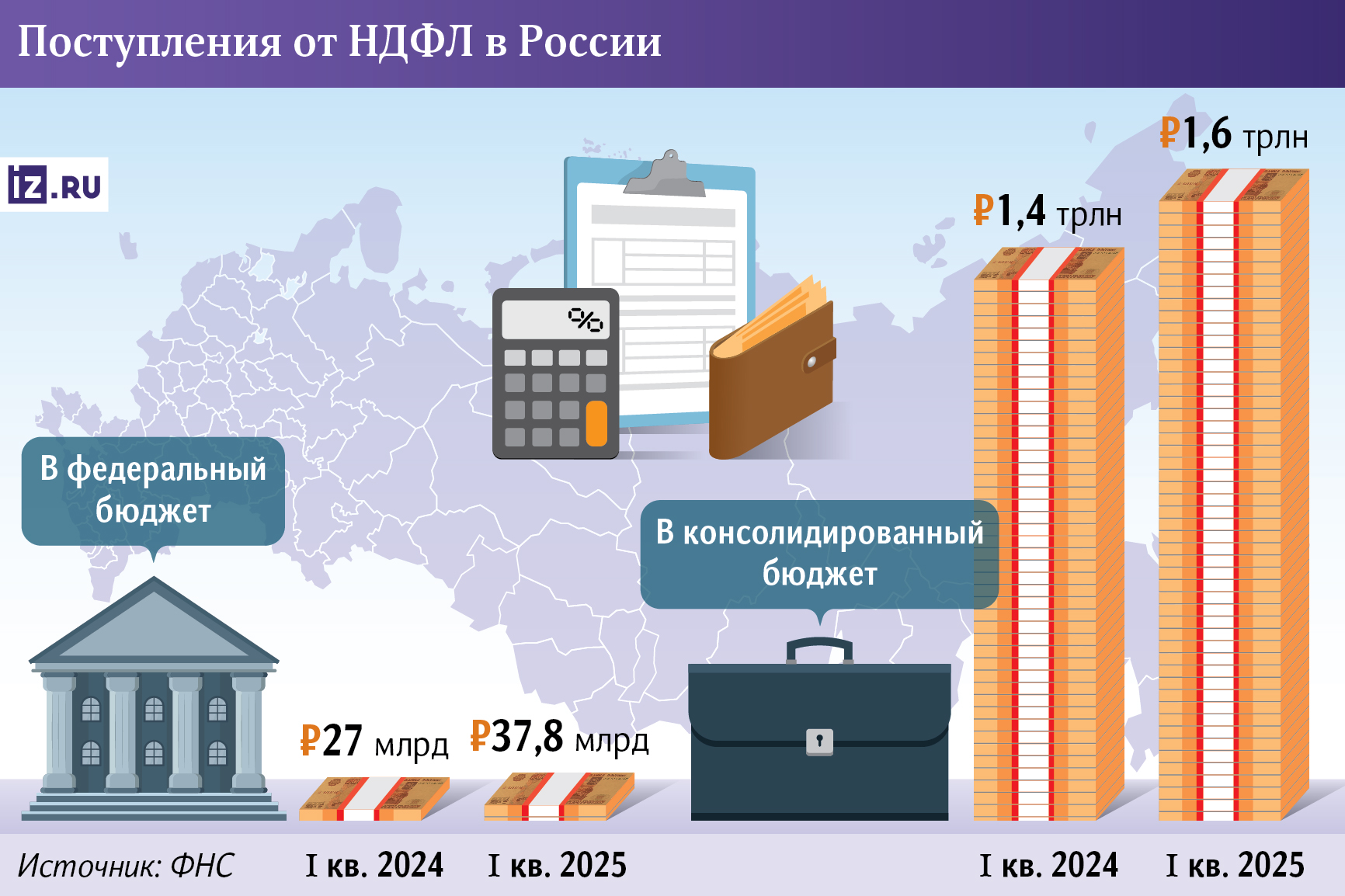- Статьи
- Economy
- Engine of progression: The Federal Tax Service for the first time disclosed income from a five-step scale
Engine of progression: The Federal Tax Service for the first time disclosed income from a five-step scale

For the first time, the tax service disclosed income from the new five-step personal income tax scale. In the first quarter of 2025, the federal budget received almost 38 billion rubles, according to the Federal Tax Service (Izvestia studied them). This is one and a half times more than last year, when there was only one gradation of the "tax on the rich." With each passing month, income from this article will increase exponentially, as more and more people cross the threshold of "increased" income. Why tax revenues are becoming much more important for the treasury in the context of lower oil prices is in the Izvestia article.
How much personal income tax was collected from the rich in Russia in 2025
After the introduction of the five-step personal income tax scale in Russia this year, revenues from this item to the federal budget are actively growing. All fees at rates above 13% go there (the rest is transferred to regional and municipal budgets). In the first three months of 2025, 37.8 billion rubles were collected at the federal level, according to Federal Tax Service statistics (Izvestia analyzed it).
This is almost 40% more than in the same period last year, when the "tax on the rich" was collected by 27 billion. However, the progressive scale was different at that moment. In 2021-2024, there were only two steps: 13% and 15%. The increased level applied to those who earned over 5 million rubles a year — in this case, 13% of this amount went to the regions, and a 2 percentage point surcharge went to the general treasury.
Since 2025, the taxation system for individuals has become more complicated. The personal income tax scale has become five—tiered - for those who receive income over 2.4 million per year, the tax rate was:
— 15% — for earnings from 2.4 million to 5 million per year (from 200 thousand to 416.7 thousand rubles per month);
— 18% — from 5 million to 20 million per year (from 416.7 thousand to 1.67 million per month);
— 20% — from 20 million to 50 million per year (from 1.67 million to 4.17 million per month);
— 22% — from 50 million per year (over 4.17 million per month).
These rates apply only to the excess amount, not to the entire income. For example, a Russian who earns from 250 thousand a month pays only 1 thousand more than what would have to be transferred at the previous 13% (or 12 thousand more per year from receipts of 3 million). As noted in the Ministry of Finance, the increased scale will affect no more than 3% of the population.
So far, the income from the "tax on the rich" is very small compared to income from personal income tax to regional and municipal budgets (fees are collected at a base rate of 13%). In the first quarter, it was 1.6 trillion rubles in total, according to the Federal Tax Service. For comparison: last year, in January – March, 1.4 trillion taxes were collected from the income of individuals.
The fact is that increased interest rates appear only when the total amount of income this year has already reached the threshold (for example, 2.4 million rubles). That is, for the first months of the year, a person will pay only the usual 13%, and then a larger amount. Thus, the federal budget's revenues of 38 billion per quarter come from the wealthiest Russians. The Federal Tax Service does not disclose what amounts fall on each of the five steps of the scale.
As the press service of the Federal Tax Service clarified to Izvestia, the increase in federal budget revenues is due not only to the introduction of a new progressive scale of taxation, but also to an increase in salaries. The tax service, referring to Rosstat data, added: the salary fund for January – February 2025 increased by 16.5% compared to the same period in 2024.
— The first quarter cannot be considered as a full-fledged marker of the assessment of tax revenues generated by progressive taxation. This is due to the fact that new taxpayers will appear, as well as some taxpayers will move from one tax scale to another," said Vadim Zasko, Dean of the Faculty of Taxes, Audit and Business Analysis at the Financial University under the Government of the Russian Federation.
He clarified that the progression will increase literally every month, and with it the amount of federal budget revenues. In addition, there will be natural jumps that are associated with seasonal incomes, as well as with the periods of dividend payments — as a rule, these are two quarters after the financial results of last year, that is, from April to September, Vadim Zasko drew attention.
The main period of growth in tax revenues under progressive taxation will be in the fourth quarter, including due to a certain tradition of paying increased premiums at the end of the year, the expert said. Izvestia sent a request to the tax service and the Ministry of Finance and asked them to estimate the receipts.
Will raising personal income tax receipts reduce the budget deficit
Additional income from increased personal income tax rates will have a positive impact on the balance of the federal budget. Oil and gas revenues are becoming increasingly difficult to predict, as hydrocarbon prices are acutely sensitive to market conditions, and fees from exporters depend on the ruble exchange rate. In particular, since the beginning of 2025, oil has fallen in price by a quarter — by May 7, the Russian Urals brand was trading at about $50 per barrel. At the same time, the ruble exchange rate has strengthened — by May it fluctuates around 80-85 rubles/$. All this led to the fact that the Ministry of Finance significantly lowered forecasts for commodity revenues for 2025 — from almost 11 trillion rubles to 8.3 trillion.
At the same time, tax revenues, in particular from individuals, are more predictable and stable. This is also why the authorities last year extensively revised and adjusted their approaches to taxation.
According to the financial plan for 2025, personal income tax receipts to the federal budget are estimated at 810.5 billion rubles, which is almost 140% more than last year, the press service of the Federal Tax Service explained to Izvestia. They clarified that while maintaining the growth rate of the wage fund, the specified parameters of the federal budget will be fully implemented. The editorial board also sent a request to the Ministry of Finance.
This increase is due to the fact that wages are actively increasing against the background of a shortage of personnel, explained Natalia Milchakova, a leading analyst at Freedom Finance Global. The Central Bank estimates that salaries will grow by 12.5% in nominal terms this year. Accordingly, the number of richer Russians who fall under the new personal income tax scale will increase.
However, it is unlikely that this will help significantly reduce the budget deficit, Natalia Milchakova believes. In the updated forecast of the Ministry of Finance for 2025, the shortage forecast was immediately tripled from 1.2 trillion to 3.8 trillion rubles. This means that even the planned increase in income tax revenues may not be enough to cover all the shortfall in oil and gas revenues and bring the budget to zero.
At the same time, the progressive scale of taxation has drawbacks — it pushes the highly paid segments of the population to come up with various tricks to avoid taxes, says Galina Sorokina, director of the Institute of Economics and Finance at the State University of Management. She recalled that at the beginning of the century, the scale was made flat precisely so that people would not go "into the shadows." The year 2025 will show how successfully the authorities will be able to administer taxes in the new conditions.
Переведено сервисом «Яндекс Переводчик»









